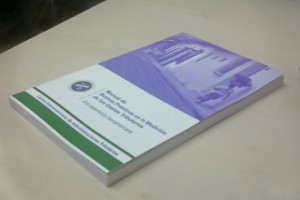CIAT´s New Handbook
Tax Expenditure Measurements
 A CIAT´s new publication was launched at our Technical Conference in Lisbon (Portugal). This is the Handbook of Best Practices on Tax Expenditure Measurements (click here to download 5MB), which reflects the efforts of the working group formed for this purpose at the end of 2009. This group was formed by delegates from the RFB of Brazil, the SII of Chile, the SRI of Ecuador, the Tax Agency of Spain, the SAT of Guatemala and the SAT of Mexico.
A CIAT´s new publication was launched at our Technical Conference in Lisbon (Portugal). This is the Handbook of Best Practices on Tax Expenditure Measurements (click here to download 5MB), which reflects the efforts of the working group formed for this purpose at the end of 2009. This group was formed by delegates from the RFB of Brazil, the SII of Chile, the SRI of Ecuador, the Tax Agency of Spain, the SAT of Guatemala and the SAT of Mexico.
Revenue mobilization has been consistently cited in various international forums such as a requirement for developing countries to achieve strong, sustained and inclusive growth. This requires continuing strengthening tax systems and improves fiscal transparency.
One mechanism that has proven to be very powerful to propose reforms to expand the tax bases of the main taxes and at the same time improve the accountability of public finances has been the tax expenditure measurements. In the last two (2) decades, developing countries have shown remarkable progress in this area, particularly the ones from Latin America.
While cost-benefit analysis are more useful to propose cuttings of tax expenditures which may not be achieving their purposes, the fiscal cost computation of these provisions is still a great methodological challenge for those responsible for these tasks, many of them are tax administrations, so the efforts in that work line are still necessary.
Although in different CIAT´s General Assemblies and Technical Conference various aspects of tax expenditures has addressed, it was not until 2009 that the CIAT Executive Committee decided to promote the creation of a working group to move forward with this work line, requiring a methodological document for the benefit of the member countries that do not have much experience in the matter.
It is pleasing to note that this guideline is fully compatible with the actions taken subsequently through the Multi-Year Action Plan for Development agreed upon by leaders of the G-20 countries in November 2010 in Seoul, South Korea, which required international organizations such as OECD, UN, IMF, WB, CIAT and ATAF, among others, to develop skills in the tax administrations for new revenue mobilizations.
The Handbook highlights the practical aspects that could face those responsible for these tasks in the tax administrations. It does not emphasize academic discussions. It is a Handbook made by tax administrators for tax administrators. It is also an excellent example of international cooperation and exchange of experiences which accomplishes the CIAT´s mission.
Although it is not the Handbook´s main purpose, it also points out the standardization of tax expenditure measurements by including a chapter on tax expenditures identification and another one that recommends the adoption of certain conventions when considering measurements. Greater efforts are needed to standardize more complex aspects such as the information sources and measurement methods to be used.
The Handbook also supports reform efforts by completing a comprehensive database of current tax expenditures in the analyzed countries and by proposing a CIAT Model Report of Tax Expenditures Measurements that provides systematic information to the authorities responsible of the cost-benefit analysis which, as mentioned before, are the most useful tools for identifying tax expenditures that may not be meeting their purposes(1).
The CIAT Executive Secretary –in charge of the working group coordination– has made available to the whole community MyCiat the electronic version of this Handbook in Spanish and English and soon will do so in Portuguese. Also, with the support of international cooperation, a comprehensive program of technical assistance and training on the subject will soon be offered to countries that request it.
The aforementioned database on tax expenditures as well as diverse literature on the subject compiled by the working group throughout their work is available to the CIAT´s Tax Studies and Research Areas Network.
The publication of this Handbook is the end of a first stage in a long agenda on tax expenditures analysis. It is necessary for the following years to broaden the analyzed taxes coverage, including excise taxes and property taxes. It would also be necessary to analyze tax expenditures on import duties, in particular if they are not from trade agreements, but from arrangements with large investments.
We must also support the efforts to incorporate more and more tax expenditure measurements in the Subnational Governments level. While this has escaped the jurisdiction of the working group, it is recommended that joint efforts be undertaken, especially in federal countries like Argentina, Brazil and Mexico or highly decentralized unitary countries like Colombia.
Working Group Members
- Filipe Nogueira de Gama y Raimundo Eloi de Carvalho (RFB Brazil)
- Patricio Barra Aeloiza (ex – SII, Chile)
- Mauro Andino y Ximena Amoroso (SRI, Ecuador)
- María Luz Gómez López y Joaquín Iglesias de Ussel (AEAT, Spain)
- Hugo Edgardo Roldán Valdez (SAT, Guatemala)
- Jorge Lecumberri López (SAT, Mexico)
- María Raquel Ayala Doval and Miguel Pecho Trigueros (CIAT Executive Secretariat)
- Ángel Gonzalez (and Isabelle Gaetan) French Mission
- Luis Cremades of the Spanish Mission
1,951 total views, 2 views today
